Overview
- The Social Democratic Party (SPD) ratified the coalition agreement with the CDU/CSU by an 84.6% majority on April 30, clearing the final barrier for Friedrich Merz to assume office as chancellor on May 6.
- The coalition agreement includes significant commitments such as a €15 minimum wage, extensive infrastructure investments, pension safeguards, and extended rent caps.
- The SPD secured the finance ministry and six other cabinet posts, with co-chair Lars Klingbeil expected to serve as finance minister and vice chancellor.
- Germany's economy, in its third year of contraction, faces challenges including U.S. trade tensions and the need for defense and infrastructure investment, priorities highlighted by Merz.
- Both major parties excluded cooperation with the far-right AfD, which achieved a record second-place finish in the February election, underscoring efforts to maintain democratic stability.


